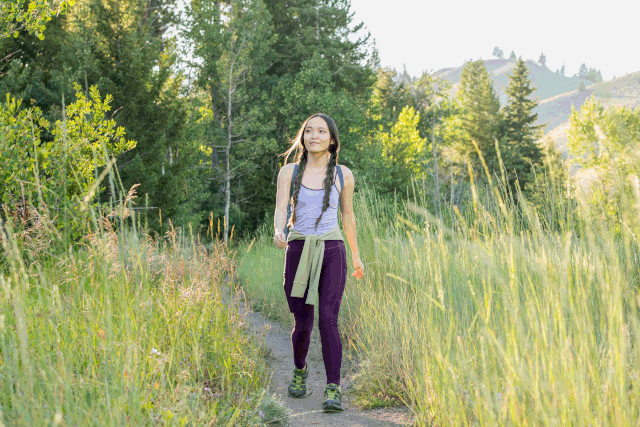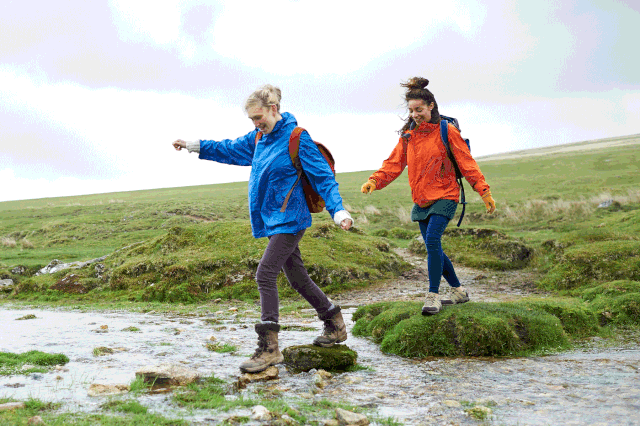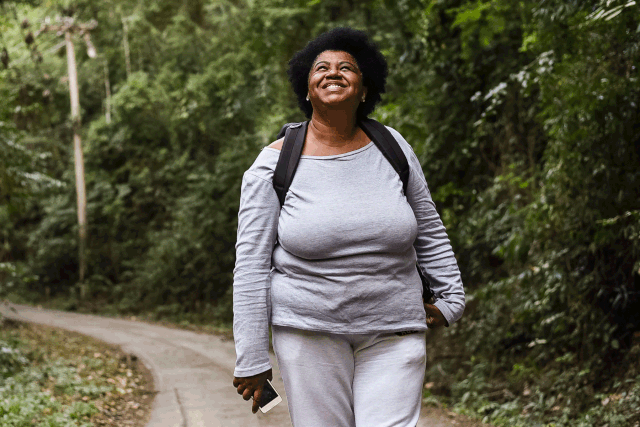The Benefits of Spending Time in Nature: Why You Should Get Outside More Often
All the healthy reasons you should head outdoors more often—and easy ways to make it a part of your daily routine.

Evgeniia Siiankovskaia/Getty Images
There’s a reason why taking a big, deep breath of fresh air feels rejuvenating for the soul. Oxygen fills your lungs, sunlight hits your face, and your body relaxes. Nature has long been considered the ultimate healer, but we humans are spending less time outdoors in our modern, fast-paced, and ever-connected way of life.
Forgoing time in nature—or just time outside in general—is a missed opportunity to benefit your mental, emotional, and physical health, because spending time in Mother Nature can help relieve stress and anxiety; boost our immune system, creativity, and focus; and teach us to live more in the present.
Here, we spoke with mental health advocates and experts to better understand all the benefits of spending time and immersing yourself in the great outdoors—as well as strategic ways to get outside more often.
Related:Instead of Embracing Hygge, You Might Want to Try Friluftsliving
The Benefits of Spending Time In Nature
It provides time to recharge and destress.

Getty Images
Our bodies are great at adapting to changes and stress to help us push through challenging times, explains Ernesto Lira de la Rosa, PhD, licensed psychologist and media advisor for the Hope for Depression Research Foundation. While this flexibility is vital for survival, prolonged periods of high stress trains our bodies and minds to view stress as normal. The result: A state of stress becomes our baseline. How can we lower stress levels and give our systems a chance to come down from being on constant high alert? Go outside, de la Rosa says.
“When we spend time in nature, we can quite literally disconnect from the everyday stressors, technology, and social interactions,” he explains. “Nature can help us ground and recharge our bodies and minds, especially if we take time to observe our surroundings.”
A review published in Frontiers in Psychology in 2020 looked at 14 studies examining the effects of being in nature on young adults (15-to-30-year-olds), with the aim of identifying an ideal “dose” of nature to achieve its healthy effects. The studies included in the review showed that time spent in nature was associated with “statistically significant differences” in various stress markers, “including decreased heart rate, salivary cortisol, blood pressure, and sympathetic nervous system activity, and increased parasympathetic nervous system activity,” according to the study discussion. And the review found that, ultimately, exposure to natural spaces for even just 10 to 15 minutes was most beneficial to improve physiological markers like blood pressure and heart rate, as well as mood and concentration.
This is likely why when you picnic with friends and feel the breeze on your face, you feel more at ease than in a highly rated, super-busy restaurant. Or why reading a book outside while listening to a nearby fountain trickle feels more calming than turning a page on a busy train.
Related:Why Being Near Water Could Be the Key to Boosting Happiness, According to Science
It supports physical health by encouraging exercise.

Getty Images
True: No matter where you exercise, increasing your heart rate is beneficial for your health. Also true: If you’re struggling to stick to an exercise routine, moving your workout outside could improve your motivation. A study published in the Journal of Epidemiology and Community Health found that people who spend time in nature or green spaces are more likely to engage in physical activity and have higher rates of keeping a healthy weight.
But you don’t need to sign up for an intense, burpee-filled outdoor bootcamp to reap the benefits. Engaging in physical activity outside—hiking, swimming, or simply walking— can lead to improved physical health, including lower blood pressure, reduced risk of heart disease, and improved immune function, explains Nicholette Leanza, a licensed professional clinical counselor for LifeStance Health.
Related:7 Easy Ways to Get More Out of Your Walks
It can boost creativity and concentration.

Getty Images
Leanza says research has also found that spending time in nature can increase creativity and improve focus. In a study published in the Journal of Environmental Psychology, researchers found that participants who spent time in nature were more creative and better problem solvers than those who spent more time in an urban environment.
Need more convincing that taking a break in nature can help you meet your looming deadline more effectively than forcing yourself to work? Leanza shares another study published in the Journal of Environmental Science and Technology, which found that people who walked in a park for 90 minutes had increased neural activity in the part of the brain associated with attention and positive affect.
It helps you live in the moment.

Getty Images
What’s longer: your ongoing to-do list that lives rent-free in your brain—or the hours you spend enjoying the sunshine? If you’re like most overworked Americans, it’s the former, but the latter is the goal. To help you release the anxiety caused by worrying about tomorrow’s stressors, going outside can encourage you to live right here and right now, according to psychologist Yvonne Thomas, PhD.
“Partaking in nature can help you appreciate where you are in that moment—and the environment around you,” she says. “In nature, you can easily practice mindfulness by taking in and being aware of life happening around you in real-time. This helps you to revel in nature's natural wonder and beauty, bringing you joy and inspiration.”
The next time a Zoom meeting sends you spiraling, leave your phone inside and go outside. Even if it’s your backyard or a small balcony. Look around and observe what you see—from the colors and the sounds to the smells. Savor them all and observe them, appreciating their details. You’ll quickly feel the stress roll off of your body.
Related:People Are Taking Therapy Outside—Here's Why Mental Health Pros Love Outdoor Therapy
How to Make Time for Nature
You know the benefits of making a date with Mother Nature daily—but actually RSVP-ing ‘yes’ and not flaking on outdoor time is another story. Rather than making grandiose commitments you know you won’t be able to meet, start small with these accessible habits to help you prioritize and enjoy more time outside.
Go outside first thing in the morning.
Depending on your life stage, you may have minimal moments for yourself throughout the day. And once everyone in the household is up and running—your self-care time is deprioritized. Rather than worrying if you can squeeze in outdoor time midday, start your morning with sunshine, recommends Gail Saltz, MD, a clinical associate professor at the New York Presbyterian Hospital Weill-Cornell School of Medicine and the host of the “How Can I Help?” podcast.
“Sunlight also helps boost mood because of the mechanisms having to do with circadian rhythm,” Dr. Saltz says. And while you might not be thinking about going to bed while making your bed in the morning, those natural, a.m. rays make a difference in the quality of your rest, too: “Exposure to sunlight helps to set circadian rhythm which helps you to go to sleep at night for better sleep,” she says.
Make a (very doable) exploration bucket list.
It can be challenging to spend quality time in nature when we’re busy, and some weeks are more packed than others. Instead of holding yourself to an impossible daily or weekly ritual, de la Rosa recommends researching local parks, hiking trails, or scenic routes. Then when the opportunity arrives, you know where to head. “You don’t have to plan a day trip or a long weekend in nature; you can also take some time to appreciate the drive home or to work by taking a more scenic route if it’s available to you,” he says.
And when do you have extra time on the weekend? Consider choosing a more leisurely hike to test out and build up your endurance over time. The more you get outdoors—the more you’ll want to return.
Choose to walk whenever possible (and safe).
Driving does save time, but sometimes when we gain one thing, we sacrifice another, says Dr. Bethany Cook, PsyD, licensed clinical psychologist and health service psychologist. The ‘other’ in this case is our bodies' exposure to both easy movement and all the benefits of nature (or at the very least being outside and exposure to natural light). Simply walking where you need to be can improve your mood and give your lungs some outside air. “Tell your spouse you’ll walk to the party but would love a ride home. Need to mail letters? Walk to the post office instead of leaving them in your mailbox. And always take the ‘scenic route,’” Cook suggests.
Eat lunch or take meetings outside.
Those with office gigs may struggle the most to accept an invite outdoors. Meetings and projects require internet access—and it’s easy to get caught up in the monotonous nature of corporate work. Though it might not seem meaningful, Leanza says even a few minutes under the sky can brighten your mood and change the course of your day.
“You could take a walk during your lunch break or take your work outside and set up a makeshift office in a natural environment,” she shares. “These small changes can help you get outside and enjoy nature, even with a busy schedule.”
If you live in a zip code with frequent warm days, Cook suggests creating a mobile work station where you can drive to a nature park and work outside. “Preplanning and knowing what you need to make it happen ahead of time will increase the likelihood of you doing it more than once,” she says. “Plus, if you plan, you’re less likely to forget something that could derail the whole experience—like forgetting your hotspot device.”
Schedule time each season.
If you live somewhere with distinct seasons, de la Rosa says it can be wonderful to explore parks or areas outside where you can see the changing of the seasons. “This may mean seeing the fall leaves and all the colors that come with the change from summer to fall. It can also mean walking during the first few warm days of spring and seeing nature return to life,” he says.
Practice deep breathing exercises.
If you have access to outdoor space at home, de la Rosa recommends taking some time outside to practice breathing exercises. “Connecting with our breath is helpful for our bodies and minds, and we can enhance this experience by situating ourselves in an outdoor space,” he says. “As you inhale and exhale, you can appreciate the air around you, the smells, and sights in your area.”
Ask yourself: Could I do this outside?
Ultimately, the best way to prioritize getting outside and being in nature more often for all its positive, healthy benefits is to shift your mindset to put the great outdoors first. Even if you're not a big nature person (not everyone likes to camp, white-water raft, or rock climb—that's OK!), it can be as simple as looking at everyday activities and to-dos as opportunities to get outside, if and when it's easy to do. Ask the restaurant if they have a table outside in the garden. Get coffee with friends—but take your drinks to-go and stroll in the park for an hour. Do your daily meditation in the backyard or on the rooftop of your apartment building. Plan an easy hike at a local nature reserve. Get into gardening. The list is endless!
And for any days when you can't even squeeze in a walk around the block, you can always bring a little bit of nature indoors to you by adopting a few easy-to-care-for house plants.
Related:70+ Fun Things to Do This Spring
For more Real Simple news, make sure to sign up for our newsletter!
Read the original article on Real Simple.

